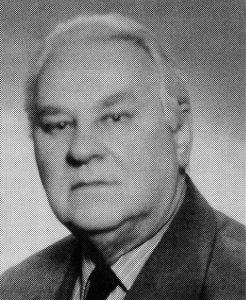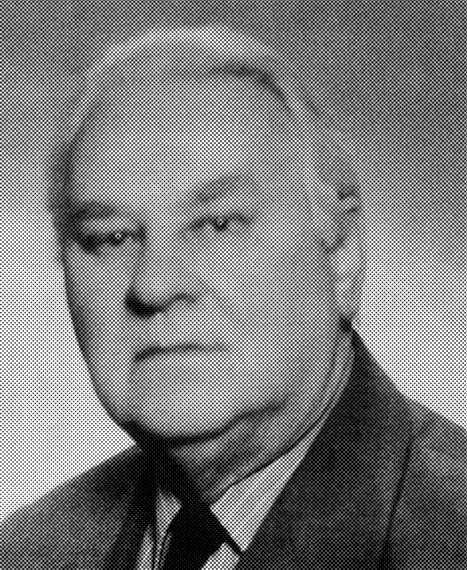
Alfons Klafkowski (1912-1992) was a Polish legal scholar and a leading theorist of international law, who made an important contribution to legal interpretations of international agreements and the legal implications of the Second World War. He was a member of the Polish delegation to the UN General Assembly from 1968 to 1978 and represented Poland in the Sixth Legal Committee of the UN General Assembly, where he served as a Vice-Chairman of the Committee in 1975 and was a rapporteur in 1971.
His academic career was closely connected with Adam Mickiewicz University in Poznan, where he worked as a director of the International Law Department, at the Faculty of Law, from 1950 to 1978, and a Director of the Legal and Political System Science Institute from 1969 to 1978. He was also a deputy dean (1950-1952) and a dean (1952-1955) of the Faculty of Law, and the Rector of the Adam Mickiewicz University twice from 1956-1962. He was also a praised lecturer, who supervised over thirty doctoral theses and was invited to give lectures in Brussels, Liege, Ghent, Moscow, Copenhagen, Montreal, Ottawa, Quebec, Rome, Florence, Milan, Helsinki and Tampere.
Klafkowski graduated Adam Mickiewicz University in 1936 obtaining a degree in legal studies. While working as a journalist and later as a deputy editor in chief of “Dziennik Poznanski”, Klafkowski prepared his first doctoral thesis on “The System of Sanctions According to the Pact 16 of the League of Nations in Italo-Abyssinian War 1936-38” under the supervision of Bohdan Winiarski at University of Poznan. The text of his first dissertation was destroyed in 1939 after the outbreak of the Second World War. During the Nazi occupation of Poland, which Klafkowski spent in Warsaw, he was not only an active member of underground resistance but also continued his academic work and wrote his second doctoral thesis titled “German Occupation in Poland in the Light of International Law” which was approved by prof. Julian Makowski. This text, however, was also lost during the Warsaw Uprising and Klafkowski himself was imprisoned at Walbrom in Malopolska. He recovered parts of this doctoral thesis after the war and successfully defended his thesis “German Occupation in Poland from the Perspective of International law. Assessment of the German Concept of General Government”, which was published in Poznan in 1946.
In his habilitation thesis from 1947, Klafkowski examined the relationship between international law and domestic law. His hypothesis on the universality of law and the supremacy of international law over domestic law was rejected by the evaluation committee as contradicting to the ideas of socialist legality. The idea of supremacy on international law became a norm integrated in the Constitution of Poland only in 1997, after the demise of communist regimes. In 1947 this was still a doctrine criticised by peers as being unacceptable for infringing national sovereignty of states. Despite this complication, Klafkowski was appointed an associate professor and a director of the International Law Department at the University of Poznan in 1950.
He is considered to be one of the most important Polish scholars of international law. His work amounts to more than 300 publications including 26 books. He published extensively on issues related to post-war prosecutions and victims’ compensation as a matter of international law: The Nuremberg Principles and the Development of International Law (Warsaw: Zachodnia Agencja Prasowa, 1966); The Legal Effects of the Second World War and the German Problem (Warsaw: Interpress Publishers, 1968). His research also focused on international agreements and legal consequences of the Second World war. In 1947, Klafkowski published the monograph Legal Foundations of the border Oder-Neisse against the Background of Agreements: Yalta and Potsdam which became a pioneering work which defined major lines of legal argumentation in support of the ultimate character of the border between Poland and Germany. This book provides thorough analysis of legal consequences of the “unconditional surrender” formular in relation to the former German Reich as a new phenomenon in the field of international law. According to him, without this formular of unconditional surrender the occupation of Germany would have unfolded differently. In place of Yalta and Potsdam agreement, resolutions of IV Hague Conference from 1907 would have to be applied and the Allied Control Council would not be able to exercise powers on the territory of sovereign Germany to the extent it did. The reconstruction of Germany would not be possible, while the diplomatic missions of the German Reich in the territory of neutral states would have not lose legal basis for their operation and could have continued their international legal as well as political fight, which could undermine the Peace Treaty for Germany. Without the unconditional surrender formular the Nuremberg trial would not have been possible, too. In his books on The Polish-German Border the 1929 and 1933 Concordats (1956) and The Potsdam Agreement from 2 August 1945 (1960) he conducted comprehensive analysis of the legal problems of the Polish-German border. The latter book was translated to English (1963) and French (1964). In his monograph Basic Legal Problems of Liquidation of the Effects of War 1939-1945 and Two German States (1966), Klafkowski reflected on international law developed in the Federal Republic of Germany (F.R.G.) which he saw as aiming to redefine international law while ignoring existing international agreements, especially those regulating the status of Germany after the Second World War.
Klafkowski also wrote a course book on Public International Law (1964) which was republished in Poland five times. When Poland and the F.R.G. signed an agreement in 1970 (The Treaty of Warsaw), in which the two States recognised each other diplomatically and acknowledged the inviolability of borders established following the 1945 Potsdam Conference, Klafkowski prepared an extensive legal interpretation of this act, published in 1978 and translated into English, French and German.
As a former member of the Polish resistance movement, Klafkowski participated in conferences organized by the Federation Internationale de la Resistance in 1978 and 1974 and represented Poland at multiple conferences of the Pugwash on Science and World Affairs. He also took active part in the conferences of the International Organisation of Democratic Lawyers, the French organisation Oder-Neisse, the World Peace Congress, and participated in the work of the Conference on Security and Cooperation in Europe in Helsinki in 1975 (the predecessor of OSCE) and in the Inter-Parliament Union in 1974-1975. From 1976 to 1984 he was a member of Archival Council of Poland and made an important contribution to the legal debates on heritage protection, especially during the war, as well as the issue of restitution and international protection of archives. In 1977, at the conference of the International Council of Archives, held in Cagliari, Italy, he proposed to recognise the Potsdam Agreement as a binding document in the field of restitution of archives, which was accepted by representatives of 44 countries and international organisations.
While Klafkowski was never a member of the communist party, he was elected as a member of the Polish Parliament (the Seym) twice, from 1972-1976 and from 1980 to 1984. Between 1982 and 1985 he was also a member of the State Council and was among the major organisers and the first President of the Polish Constitutional Tribunal (1985-1989), an institution that played an important role in the juridification of late socialism in Poland.
Nelly Bekus (Exeter University)
Bibliography
-
Podstawy prawne granica Odra-Nysa na tle umów: jałtańskiej i paczdamskiej, Poznań, Instytut Zachodni, Poznan, Instytut Zachodni, 1947. (Legal Foundations of the Border Oder-Neisse against the Cackground of Yalta and Potsdam Agreements)
-
Sprawa traktatu pokoju z Niemcami, Warszawa, Wydawnictwo Prawnicze, Warsaw, 1953. (The Problem of a Peace Treaty with Germany)
-
Granica polsko-mieniecka a konkordaty z lat 1929 i 1933 Warszawa, Instytut Wydawniczy PAX, 1959. (Polish-German Border and Concordats of 1929 and 1933)
-
The Potsdam Agreement of 2 August 1945. The legal foundations of the liquidation of the effects of the Polish - German war of 1939–1945, Warsaw, 1960
-
Basic legal problems of liquidation of the effects of war 1939-1945 and two German states. Poznan, 1966
-
The Legal Effects of the Second World War and the German Problem. Warsaw. Interpress, 1968
-
Problematyka indywidualnych odszkodowań wojennych w związku z II wojną światową, Bielsko-Biała, Warsaw, 1991 (The Problem of War Compensation connected with World War II, Bielsko-Biala: The Association of War Victims)


